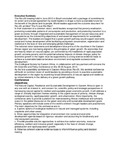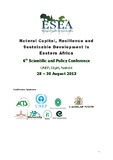| dc.description.abstract | The Rio+20 meeting held in June 2012 in Brazil concluded with a package of commitments
for action and a broad agreement by world leaders to shape a more sustainable future for
the benefit of the planet and its people. World leaders approved the outcome document for
Rio+20, entitled “The Future We Want”.
In their statement of a common vision, world leaders recognized that poverty eradication,
promoting sustainable patterns of consumption and production, and promoting transition to a
green economy through integrated and sustainable management of natural resources and
ecosystems as the overarching objectives of and essential requirements for sustainable
development. The leaders envisaged that a green growth pathway would support economic,
social and human development while facilitating ecosystem conservation, regeneration and
resilience in the face of new and emerging global challenges.
The national vision statements and development blue prints of the countries in the Eastern
African region are now being aligned to the principles of green growth. As economies that
are heavily reliant on natural capital, yet confronted by the headwinds of rapid population
growth, extreme poverty and the potential adverse impacts of climate change, policy for
economic growth in the region must be supported by a strong science evidence-base to
achieve a sustainable balance between environment and equitable socioeconomic
development.
The Ecological Society for Eastern Africa, in collaboration with key partners will convene the
6th Scientific and Policy Conference on the 28-30 August, 2013.
As the first sustainbility conference in Eastern Africa since Rio+20, this seminal conference
will build on common vision of world leaders by providing a forum to examine sustainable
development in the region by examining broad dimensions of natural capital and resilience
as critical elements in the delivery of a green growth pathway.
Conference
objectives
The Natural Capital, Resilience and Sustainable Development in Eastern Africa is open to
any one with an interest in, and concern for, scientific, policy and strategic perspectives in
harnessing natural capital for resilient and equitable green economic growth. It will address a
range of critically important themes relating to the urgent issues of poverty, climate change,
ecological scarcity, rapid population growth, and urbanization. More importantly, the
conference aims to provide a platform for mainstreaming African intellectual and scholarly
output in the global discourse on the green economy and sustainable development goals.
Plenary speakers will include some of the world’s eminent thought leaders and practitioners.
The main objectives for this conference are to:
a. Explore options of ecological resilience in natural and managed systems: including
croplands and urban areas;
b. Show opportunities for integration of environment into social and economic
development agenda based on rigorous valuation and accounting for biodiversity and
vital ecosystem services;
c. Provide possible solution approaches to achieve low carbon economy, resource
efficiency, resilient and inclusive growth especially in the face of climate change,
globalization and rapid population growth;
d. Advance coherent science evidence-base to inform/influence policy and decision
making. | en |


